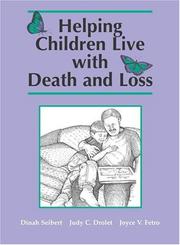| Listing 1 - 5 of 5 |
Sort by
|

ISBN: 1452265151 184972587X 9781452265155 1412914299 9781412914291 0761925147 9780761925149 9781849725873 Year: 2003 Publisher: Thousand Oaks, Calif. : Sage Publications,
Abstract | Keywords | Export | Availability | Bookmark
 Loading...
Loading...Choose an application
- Reference Manager
- EndNote
- RefWorks (Direct export to RefWorks)
The 'Handbook of Death and Dying' takes stock of the vast literature in the field of thanatology, arranging & synthesizing what has been an unwieldy body of knowledge into a concise, yet comprehensive reference work.
Death --- Thanatology. --- Death studies --- Social aspects. --- Study and teaching --- Thanatology --- #SBIB:043.AANKOOP --- #SBIB:314H220 --- #SBIB:REFCOLL2003 --- Social aspects --- Mortaliteit: algemeen --- Mort --- Thanatologie --- Handbooks, manuals, etc. --- Handbooks, manuals, etc --- Aspect social --- Guides, manuels, etc. --- Attitude to Death. --- Terminal Care.
Book
ISBN: 2749226953 Year: 2003 Publisher: Toulouse (33 avenue Marcel Dassault 31500) : ERES,
Abstract | Keywords | Export | Availability | Bookmark
 Loading...
Loading...Choose an application
- Reference Manager
- EndNote
- RefWorks (Direct export to RefWorks)
De 1989 à 1999, un groupe de réflexion interdisciplinaire sur le diagnostic prénatal et ses aspects psychologiques, animé par Didier David, psychiatre, s'est réuni tous les mois, à l'hôpital Saint-Vincent-de-Paul, à Paris. Sylvie Séguret, psychologue clinicienne, assurait le secrétariat de ce groupe. Chaque année, elle s'attachait à publier un livret reprenant les exposés des intervenants invités, tous praticiens de la périnatalité : gynécologues-obstétriciens, pédiatres, échographistes, sages-femmes, puéricultrices, psys… Ces textes nous ont semblé mériter une plus large diffusion, par leur qualité, leur ouverture et le panorama historique des réflexions qu'ils ont mis au jour, en une décennie, autour des questions encore si débattues aujourd'hui du diagnostic anténatal et de la médecine fœtale.
Diagnostic Techniques, Obstetrical and Gynecological --- Family --- Delivery of Health Care --- Attitude --- Behavior and Behavior Mechanisms --- Health Care Quality, Access, and Evaluation --- Psychology, Social --- Diagnostic Techniques and Procedures --- Psychiatry and Psychology --- Diagnosis --- Health Care --- Analytical, Diagnostic and Therapeutic Techniques and Equipment --- Prenatal Diagnosis --- Family Relations --- Attitude to Death

ISBN: 9780585496471 0585496471 9780585496474 0809324644 Year: 2003 Publisher: Carbondale : Southern Illinois University Press,
Abstract | Keywords | Export | Availability | Bookmark
 Loading...
Loading...Choose an application
- Reference Manager
- EndNote
- RefWorks (Direct export to RefWorks)
Children and death. --- Thanatology. --- Bereavement in children. --- Loss (Psychology) in children. --- Children --- Children and death --- Thanatology --- Bereavement in children --- Loss (Psychology) in children --- Attitude to Death. --- Child. --- Bereavement. --- Counseling --- Childhood --- Kids (Children) --- Pedology (Child study) --- Youngsters --- Age groups --- Families --- Life cycle, Human --- Child psychology --- Emotions in children --- Death --- Death studies --- Death and children --- Bereavements --- Minors --- Attitudes to Death --- Death, Attitude to --- Death, Attitudes to --- Counseling of. --- Counseling of --- methods. --- Study and teaching --- Children.
Book
ISBN: 2130738230 Year: 2003 Publisher: Paris (6, avenue Reille 75685) : P.U.F.,
Abstract | Keywords | Export | Availability | Bookmark
 Loading...
Loading...Choose an application
- Reference Manager
- EndNote
- RefWorks (Direct export to RefWorks)
Nos sociétés connaissent une profonde transformation des sensibilités et des attitudes individuelles et collectives à l'égard de la mort. Face aux interrogations éthiques et aux débats suscités par la souffrance des malades, l'acharnement thérapeutique et l'euthanasie, « bien mourir » est devenu une préoccupation pour chacun d'entre nous. Jamais l'aspiration à une mort calme, sans douleur, entourée et pacifiée n'a été aussi forte, comme en témoigne le développement récent des soins palliatifs. On voit ainsi s'affirmer une nouvelle conception de la fin de vie, marquée à la fois par le projet de resocialiser la mort et par la volonté d'accompagner au plus près l'expérience intime de la personne mourante. À partir des situations concrètes vécues par les patients hospitalisés en service de soins palliatifs, l'auteur montre comment cette médecine accorde une place significative à la subjectivité et aux émotions du malade. La dernière période de l'existence est considérée par les professionnels comme un moment privilégié d'affirmation de l'individu, qui doit parvenir à prendre conscience de sa mort prochaine, voire l'accepter. Cet ouvrage propose d'interroger cette idéologie normative du « bien mourir » en analysant comment la fin de vie devient le lieu d'une nouvelle utopie sociale, dont les soins palliatifs sont emblématiques. Il constitue une des premières enquêtes sociologiques sur ce sujet, et s'appuie notamment sur le témoignage des médecins et soignants, mais aussi sur l'observation ethnographique des lieux de fin de vie et des pratiques de soins. Il permet ainsi de mieux comprendre la réalité quotidienne du travail à l'approche de la mort et les stratégies déployées par les professionnels confrontés à la souffrance des patients et à la nécessité d'humaniser les derniers moments de chacun.
Terminal Care --- Palliative Care --- Thanatology --- Sociology --- Attitude to Death --- Social Sciences --- Patient Care --- Philosophy --- Delivery of Health Care --- Attitude --- Behavior and Behavior Mechanisms --- Anthropology, Education, Sociology and Social Phenomena --- Therapeutics --- Health Services --- Health Care Quality, Access, and Evaluation --- Humanities --- Behavioral Sciences --- Analytical, Diagnostic and Therapeutic Techniques and Equipment --- Health Care Facilities, Manpower, and Services --- Health Care --- Behavioral Disciplines and Activities --- Psychiatry and Psychology --- Gerontology --- Social Welfare & Social Work

ISBN: 1557989540 9781557989543 Year: 2003 Publisher: Washington, DC : American Psychological Association,
Abstract | Keywords | Export | Availability | Bookmark
 Loading...
Loading...Choose an application
- Reference Manager
- EndNote
- RefWorks (Direct export to RefWorks)
This book explores the emotions of despair, fear, and anger that arose after the terrorist attacks on the World Trade Center and the Pentagon in the autumn of 2001. The authors analyze reactions to the attacks through the lens of Terror Management Theory, an existential psychological model that explains why humans react the way they do to the threat of death and how this reaction influences their post-threat cognition and emotion. The theory provides ways to understand and reduce terrorism's effect and possibly find resolutions to conflicts involving terrorism. The authors focus primarily on the reaction in the US to the 9/11 attack, but their model is applicable to all instances of terrorism, and they expand their discussion to include the Israeli-Palestinian conflict. This book has practical implications and will be a resource for mental health practitioners, researchers, and anyone concerned with the causes and effects of terrorism.
September 11 Terrorist Attacks, 2001 --- Terrorism --- Terror --- Fear of death --- Stress, Psychological --- Attitude to Death --- #SBIB:327.5H20 --- 316.64 --- Attitudes to Death --- Death, Attitude to --- Death, Attitudes to --- Psychological Stress --- Stress, Psychologic --- Suffering --- Anguish --- Emotional Stress --- Life Stress --- Mental Suffering --- Life Stresses --- Psychologic Stress --- Psychological Stresses --- Stress, Emotional --- Stress, Life --- Stresses, Life --- Stresses, Psychological --- Suffering, Mental --- Death, Fear of --- Thanatophobia --- Acts of terrorism --- Attacks, Terrorist --- Global terrorism --- International terrorism --- Political terrorism --- Terror attacks --- Terrorist acts --- Terrorist attacks --- World terrorism --- 316.64 Maatschappelijke attitudes --(sociale psychologie) --- Maatschappelijke attitudes --(sociale psychologie) --- Psychological aspects --- psychology --- Vredesonderzoek: algemeen --- September 11 Terrorist Attacks (2001) --- United States. --- Peur de la mort --- Terror. --- Fear of death. --- Death --- Psychology, Pathological --- Fear --- Direct action --- Insurgency --- Political crimes and offenses --- Subversive activities --- Political violence --- Stressor, Psychological --- Psychological Stressor --- Psychological Stressors --- Stressors, Psychological --- Sufferings --- Psychological aspects. --- Attentats du 11 septembre 2001, Etats-Unis --- Terrorisme --- Aspect psychologique --- Delivery of Health Care --- Violence --- Psychophysiology --- Behavioral Symptoms --- Attitude --- Crime --- Behavior --- Social Problems --- Behavior and Behavior Mechanisms --- Health Care Quality, Access, and Evaluation --- Psychological Phenomena and Processes --- Psychiatry and Psychology --- Criminology --- Sociology --- Health Care --- Social Sciences --- Anthropology, Education, Sociology and Social Phenomena --- Criminology, Penology & Juvenile Delinquency --- Social Welfare & Social Work --- September 11 Terrorist Attacks, 2001 - Psychological aspects --- Terrorism - United States - Psychological aspects --- Terrorism - Psychological aspects
| Listing 1 - 5 of 5 |
Sort by
|

 Search
Search Feedback
Feedback About UniCat
About UniCat  Help
Help News
News